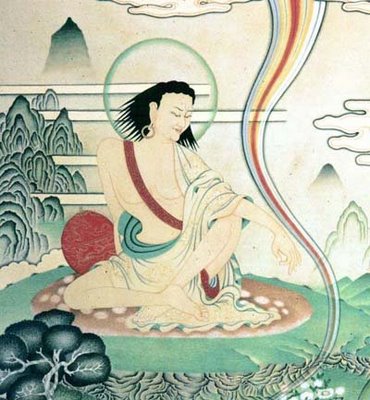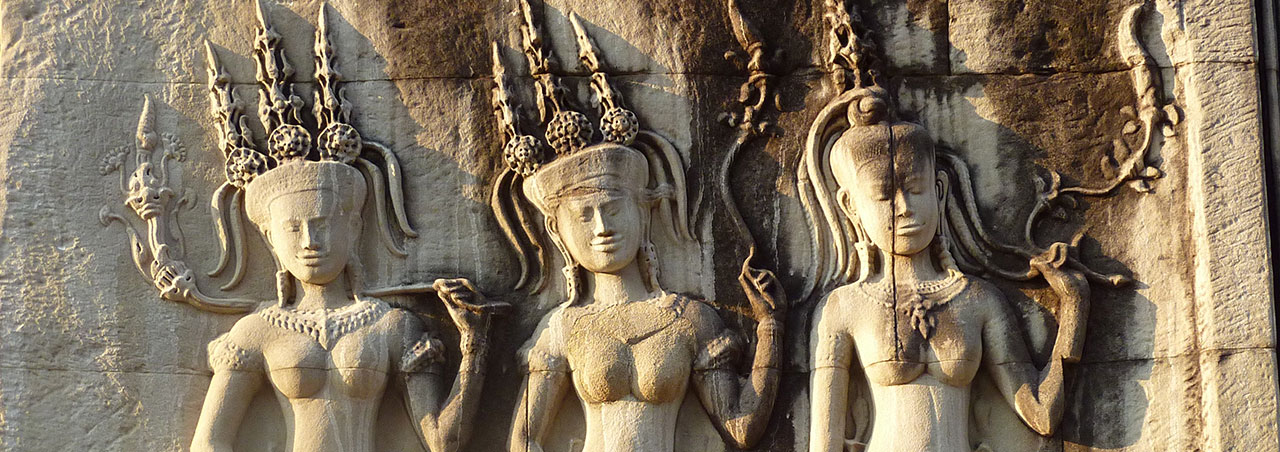In response to a question asking:
if anyone can explain exorcism from the Buddhist point of view? And also things like black magic and voodoo and stuff like that?
Exorcism – I guess this generally refers to the removal of some sort of ‘spirit’ or being which is either possessing another being, or is around a person or particular location. In either case, it is seen as an unwanted guest who there is a desire to remove.
The Chod perspective on spirits or demons
There are a number of things here from a Buddhist point of view. One way to look at this is from that of the Chod practice, (which is my main practice, by the way, so I’m talking from personal experience here). If you are not familiar with this, it is a practice from the Tibetan Siddha Machig Labdron, which is based on the Prajnaparamita sutras, and which aims to ‘cut off’ demons.
These demons are seen as two-fold. Firstly, the sense of ‘external’ beings which it is desired to remove. And secondly, as mental defilements and obscurations which are desired to remove.

Relative Bodhicitta
To deal with the external demons case, which is more relevant to your email, here we work in terms of both Relative and Ultimate Bodhicitta. So, in terms of accepting the ‘reality’ of the appearance of the spirit or demon, our approach to them is one of relative Bodhicitta, in other words, of compassion. So rather than reacting with fear, or anger, or trying to push away the being, we open our hearts and use compassion. In Chod, we actually offer our bodies and other capacities to the demon to feast themselves on. So the key thing here at the relative level is that exorcism of the unwanted demon is through compassion and generosity for that being.
Ultimate Bodhicitta
Ultimately, the approach is in terms of Ultimate Bodhicitta, which refers to the realisation of emptiness. So they key to a permanent solution to the problem of the unwanted demon is that of seeing the ultimate nature of the demon and the situation, in other words to realise its emptiness. This is the most thorough and final solution, as it were.
So we can say that at a relative level we use compassion and generosity towards this being, whilst at an ultimate level, we realise the emptiness of the situation. As a result, in both cases, no harm comes to either ourselves, nor to the unwanted being.
Generally, if you live in a Buddhist countries, you will often find that a monk or lama is called in to clear a place or person of possession, usually through performing a ritual. It is said that the deeper the realisation of emptiness of the monk, then the more likely the result will be positive.
Possession vs Mental Illness
In terms of someone being possessed, and looking at it from a western psychological perspective, it is often said that what is called ‘possession’ in the east is a form of mental illness, or imbalance from a western perspective. Thus such things as schizophrenia get mentioned. The person is labelled as having visual or aural hallucinations.
Sometimes this can happen as a result of incorrect meditation methods, perhaps without the correct guidance, where someone goes quite far down a particular path of meditation without the necessary balancing factors.

What is magic?
Black magic – is talked of as different from white magic, the former being magic used for ‘bad’ or ‘evil’ purposes. So what is magic? Generally I’d say it’s the ability to make things happen in physical world, through using mental and usually ritual activity.
The example can be given of Milarepa, who was able to bring down hail, and also cause a house to be brought down through his ritual and visualisation actions. In this case, a particular being was invoked to lend its power to the action desired.

In Kabbalistic magic which I have personal experience of, again you invoke a powerful being in order to make things happen. In a sense, the key here is that through magic the commonly accepted seeming ‘rules’ of the physical universe no longer seem to apply. So they break the rules of accepted science.
What is Voodoo?
Voodoo generally involves gaining control over another person, again through some ritual and mental actions. In Buddhist countries, spells can be quite popular. For example in Thailand, my wife’s sister had a spell placed on her, and she then vomited razor blades.

Buddhist approach to black magic and voodoo
So how are black magic and voodoo explained from a Buddhist point of view? Well, all things are interconnected. The web of causes and conditions are infinite, so things that happen in one location can affect those in another remote location. Similarly, things in the mental realm can affect the physical realm. The ability to affect the physical realm, and other beings would seem to be connected to Siddhi powers, those things which are by-products of meditation practice.
As you progress in your practice, then the way things are starts to change for you. You are no longer limited by your perspective to affecting things as you used to. You gain the ability to make things happen which someone with lesser realisation cannot make happen.
These abilities are always seen as a by-product, not something to be actively pursued, and once gained, always to be used with Bodhicitta, for other beings’ welfare.
I hope these thoughts are of help to you?
Best wishes in the Dharma



